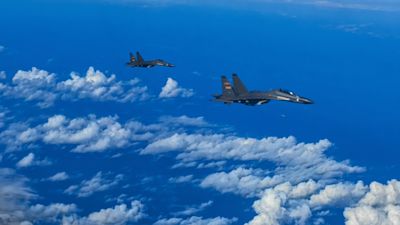Insight
China's extended military drills raise fears of Taiwan conflict

Is this the start of its takeover of Taiwan or still punishment for Nancy Pelosi's visit? ITV News Asia Correspondent Debi Edward reports
The now extended Chinese military drills are not only giving us an insight into how mighty a army China has amassed, but how dangerous and brazen a country it has become under Xi Jinping. The war games, which the Communist party claims are a necessary and fair response to the provocation of Nancy Pelosi’s visit to Taiwan, are thought to have been planned for months.
Taiwanese intelligence sources believe preparations were made when it was first announced that the US Speaker of the House would travel to Taipei during her tour of Asia.
Her trip was originally scheduled for April, but was postponed after she tested positive for Covid - giving the Chinese military time to prepare should she defy Beijing’s warnings not to come.
She did, and the Chinese Communist Party (CCP) has reacted - or overreacted - in a way which threatens the peace and stability of Asia.
The live-fire drills it said would run from Thursday to Sunday last week will now continue indefinitely with additional exercises being conducted off its Eastern coast placing South Korea and Japan on alert.
It has forced Taiwan to launch a counter response; it will launch its own artillery exercises on Tuesday and Thursday.
Up until now, it had been in a defensive posture, monitoring Chinese activity in the air and sea off its coast, seeing off fighter jets and warships which have crossed the median line, an unofficial divide between the two nations.
Aiming not to engage, the Taiwanese military has deployed its forces to block breaches of its territory.
The decision by China to suspend cooperation and dialogue with the United States in eight areas, including military and defence, has significantly increased the risk of accidental confrontation.
The US has defence forces stationed in the region observing all activity, and ready to support Taiwan if necessary.
In recent months there were already some dangerous intercepts in the air and on the seas. Without communication, the potential for similar incidents is heightened, as is their chance of escalating.
Tensions between China and Taiwan have been increasing for years, worsening since President Tsai of the Democratic Progressive Party (DPP) came to power in 2016.
Want a quick and expert briefing on the biggest news stories? Listen to our latest podcasts to find out What You Need To Know
All dialogue between Beijing and Taipei has ceased since she came into office, and in 2020 she increased her power with a convincing election win that gained her a second term. During the same period President Xi scrapped term limits in China, paving the way for him to lead the CCP for life, and he has made reunification one of his top aims, including it in a grand plan for the rejuvenation of the nation.
He is not the first Chinese President to dream of reunification, but he is the first to have built-up an army with that purpose in mind and to have indicated it is an ambition he wants to realise during his reign.
The people we’ve spoken to in Taiwan were either dismissive or unafraid of the prospect of war. They’ve become conditioned to the threats of their belligerent neighbour.
Those we’ve met here in Pingtan, on the other side of the Strait, also play down the chances of conflict. They’ve been led to believe reunification is a shared dream which President Xi can achieve by peaceful means.
The coming days and weeks won’t look like that is the intention.